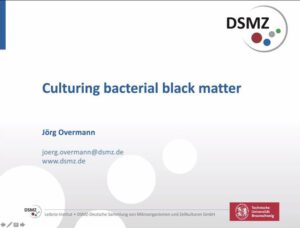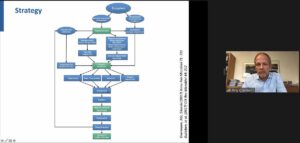On 14th of July 2022 we had the pleasure of welcoming Prof. Jörg Overmann, Scientific Director of the Leibniz Institute DSMZ (German Collection of Microorganisms and Cell Cultures) and Professor of Microbiology at the University of Braunschweig to the MultiKulti webinar.
Prof. Dr. Overmann already successfully isolated numerous new bacterial species by applying innovative cultivation methods and thus, in his talk he was able to give valuable insights into various cultivations strategies to the MultiKulti-team and many interested guests. Even though the analysis of metagenomes nowadays gives us an idea of the metabolic potential of microorganisms, many “hypothetical genes” still hamper the prediction of their specific role in the environment. Therefore, obtaining new isolates is essential.
In his presentation “Culturing Bacterial Black Matter” Prof. Dr. Jörg Overmann pointed out that the majority of bacterial phyla contains only not yet cultivated species (see Hug et al., 2016). This is also reflected in the phenomenon of the “Great Plate Count Anomaly” – the fact that cell numbers of environmental samples obtained by culture-dependent methods are orders of magnitude lower than abundances determined microscopically. This raises the question of whether there really are “unculturable” microorganisms? Prof. Dr. Overmann is convinced that the fact that only a minority of naturally occurring microorganisms can be cultivated with current laboratory techniques is not due to the microorganisms, but rather to the inability of microbiologists.
To overcome this challenge, Prof. Dr. Overmann presented strategies that also use environmental parameters, literature data and molecular methods to predict suitable cultivation conditions. These include classical methods such as adjusting incubation parameters, as well as media and buffers (e.g. pH, natural substrate concentrations, gelling agents…). In addition, more advanced approaches such as high-throughput methods (“culturomics”), chemotaxis assays or cultivations from biofilms can be used. As some microorganisms cannot exist in the environment without certain partners, future approaches should also focus on bacterial interactions and e.g. signalling molecules for the enrichment of previously uncultured microorganisms.
All participants followed the talk with great interest, which could also be seen during the lively Q&A session that followed the comprehensive lecture. We thank Prof. Dr. Jörg Overmann for his time and the inspiring presentation.
The next MultiKulti webinar will take place online on Thursday, 8th of September 2022 at 4:15 pm.


